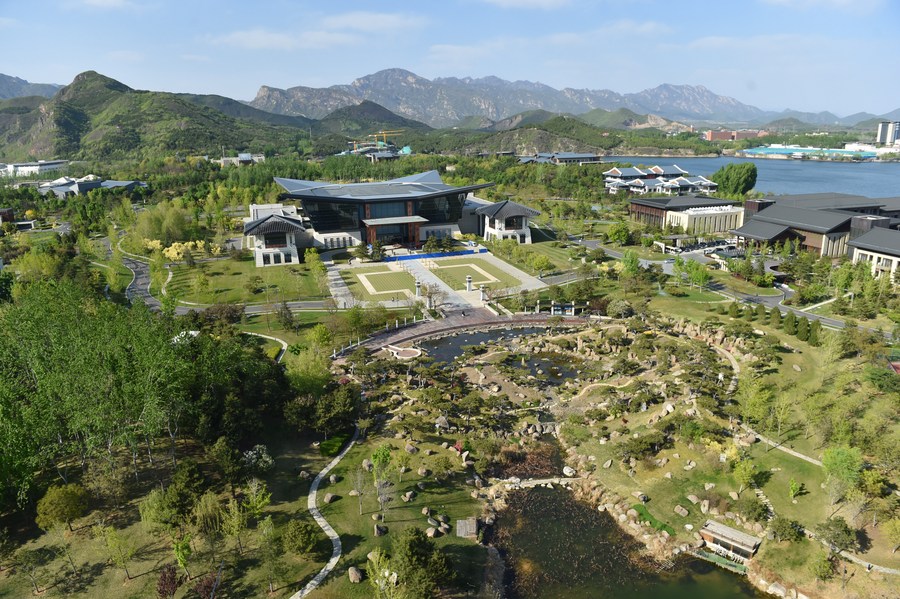Xi Story: From sapling to flourishing tree, vision of shared future thrives

Photo taken on April 23, 2020 shows the scenery at Yanqi Lake in Huairou District of Beijing, capital of China. (Xinhua/Chen Zhonghao)
Stepping onto an islet in Yanqi Lake of Beijing's Huairou District, one can easily spot a grove of 21 white-barked pines standing in the tranquil location.
On Nov. 11, 2014, Chinese President Xi Jinping, along with leaders and representatives from other Asia-Pacific Economic Cooperation (APEC) economies, planted these trees to express the hope that the 21-member APEC community will realize common development.
Earlier, when addressing the opening ceremony of the APEC CEO Summit on Nov. 9 that year, Xi noted that Asia-Pacific countries ought to act in the spirit of the Asia-Pacific community and out of a sense of a shared future, following the trend of peace, development and mutually beneficial cooperation, and jointly work for the prosperity and progress of the region.
Xi's speech expounded on an Asia-Pacific version of the grand vision of building a community with a shared future for humanity, which he first put forward during his visit to Russia in 2013.
During the past decade, the vision bearing China's hope for the world to realize common development through win-win cooperation has continued to flourish, much like the trees that were planted at Yanqi Lake.
Xi, also general secretary of the Communist Party of China (CPC) Central Committee and chairman of the Central Military Commission, has on many occasions demonstrated the country's commitment in this regard.
In 2020, in the face of the unprecedented COVID-19 pandemic, Xi announced China's decision to make its COVID-19 vaccines a global public good while addressing the opening ceremony of the World Health Assembly in May.
In the years that followed, China has provided more than 2.2 billion doses of the COVID-19 vaccine to over 120 countries and international organizations. This has not only complemented global efforts to combat the virus but has also illustrated China's determination to fulfill its responsibilities during times of crisis.
China's commitment to fostering global development is also exemplified by the Belt and Road Initiative (BRI), which was initially proposed by Xi in 2013. Today, the BRI has evolved into a high-quality public good with its benefits shared by the world.
Statistics showed, over the past decade, the BRI has brought nearly a trillion U.S. dollars of investment, established over 3,000 cooperation projects, created some 420,000 jobs in countries along the routes, and helped lift nearly 40 million people out of poverty.
A noteworthy example can be traced back to Nov. 16, 2022, when Xi and his Indonesian counterpart Joko Widodo jointly issued the command to commence the operational trial of the Jakarta-Bandung High-speed Railway. This railway represents Southeast Asia's first high-speed railway and is a crucial project established under the BRI framework.
In terms of maintaining global peace and security, China has not only continued to be the largest contributor of peacekeeping troops among the permanent members of the UN Security Council, but also played an active role in defusing security risks and handling global security challenges.
Speaking on the ongoing Ukraine crisis during his just-concluded visit to Russia, Xi reaffirmed that China will continue to stand firm for peace and dialogue and on the right side of history, which is in line with the spirit of a 12-point proposal on ending the conflict in Ukraine put forward by China in February.
In addition to the tangible actions by China, the impact of this vision of a shared future today also stems from its continuously expanding connotations.
Xi proposed the Global Development Initiative in 2021 and the Global Security Initiative in the following year. Respectively, the two initiatives focus on global development under the impact of COVID-19 and pooling global efforts in maintaining world peace and security.
At the CPC in Dialogue with World Political Parties High-Level Meeting on March 15 this year, Xi proposed the Global Civilization Initiative, which highlights respect for the diversity of civilizations, common values of humanity, international people-to-people exchanges and cooperation, among other aspects.
These initiatives -- each designed to address global challenges -- offer Chinese perspective and wisdom to countries across the globe, enabling them to bridge their differences and forge cooperation toward promoting global development.
In a reply letter to teachers and students from St. Margaret College Secondary School in Malta last year, Xi cited an ancient Chinese adage to emphasize that peace and harmony among all nations have long been a cherished aspiration of the Chinese people for human society. He further remarked that this ideal serves as the cultural foundation for the vision of building a community with a shared future for humanity.
Just as Xi once put it in a speech in 2013, one should not only seek one's own development, but also work for the common development of all. To better make his point, he quoted a famous Chinese saying: "One tree does not make a forest."








